-
Farewell to Dartmouth Street
18 February 2025 by Erin LeeIn recent times, we have been carefully considering what we need from a central office premises.
We’ve been talking with our teams, evaluating how we’ve been using the building, and thinking about what this might look like in the future.
With this in mind, we put our Dartmouth Street head office on the market in November; our plan being that we would use a proportion of the funds from the sale to put back into further enhancing our service spaces.
The demand for the building was high and we were pleased to agree a sale much more quickly than we anticipated, with completion in early February 2025.
Although Dartmouth Street is in a great central London location, the building layout wasn’t very accessible nor conducive to collaborative working. Also, the way our central teams have been working over the past 4 years has changed significantly, with the building being used much less often and by fewer people.
So, rather than investing in another central space right away, we’re embarking on an exciting project to review what we actually need – exploring alternative ways of working and different set-ups. We want this to work for our people and also be environmentally conscious, sustainable and forward thinking.
Although we are sad to say goodbye to Dartmouth Street, we think that this is a positive step for Via and are looking forward to seeing what the future holds.
Via’s new registered address is Passmores House, Third Avenue, Harlow, Essex, CM18 6YL.
Category: News, UncategorizedTags: Announcement | Comments Off on Farewell to Dartmouth Street
-
Via Redbridge manager celebrates prestigious apprenticeship Distinction
17 February 2025 by Erin Lee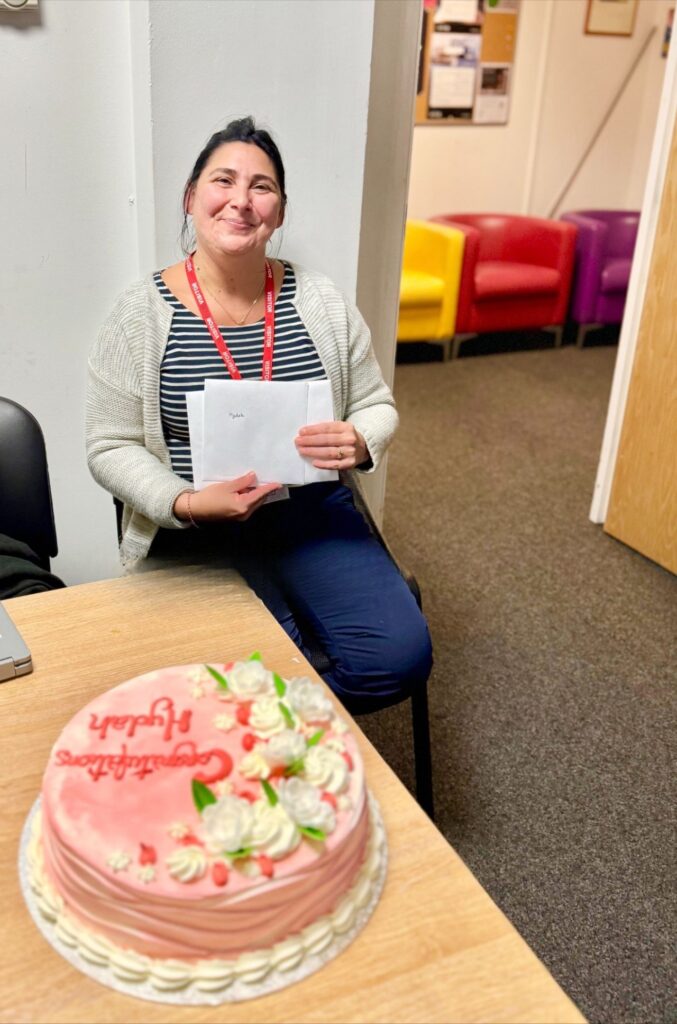
Pictured: Hydah Nawab (Deputy Service Manager at Via Redbridge).
Hydah Nawab, Deputy Service Manager at Via Redbridge, has recently earned a distinction in her ILM Level 5 Leadership & Management course – an exceptional accomplishment, as this grade is rare.
Hydah said: “I initially negotiated that I would be enrolled on a Level 5 at my offer stage for the role I’m in and was enrolled after I passed my probation. Throughout the apprenticeship I was provided with study leave and supported in my projects by my manager. Happy – a B Corp offering workplace consultancy and learning experiences, were extremely supportive throughout my course, and it was the first time that education has been enjoyable for me.”
Helen O’Connor, Via Area Manager for Redbridge said: “Overcoming several personal challenges along the way, Hydah has worked extremely hard with a high level of focus on her apprenticeship, studying towards Maths and English exams alongside building an extensive portfolio of reflection and evidence of the knowledge, skills, and experience she has acquired throughout the programme. The timing of her End Point Assessment coincided perfectly with our launch of our wellbeing coaching programme, Re-new, which Hydah used as her final project. She was able to draw upon a wide range of learning from her course, as well as her own depth of experience and knowledge in the sector to get us ready to promote Re-new widely across the borough.”
Sarah Edwards, Senior Facilitator and Apprenticeship Assessor at Happy, praised Hydah’s resilience and determination: “Hydah has been remarkable, and she’s overcome so much over the last couple of years. There were times that I thought it might be sensible for her to take a break from her learning, but her hard work and perseverance carried her through. Distinctions are hard to get, and they require something special from the candidate which Hydah clearly exhibited.”
Nicole Martins, Apprenticeship Coordinator at Happy, emphasized the challenges apprentices face: “Apprentices must be adaptable, finding ways to meet the competing demands of their job, studies, and personal commitments. They must attend regular training, coaching, and progress review meetings. Apprentices must prioritise and set boundaries to effectively manage their time. Above all, apprentices must be brave and undergo a journey of self-discovery, to learn who they are as leaders, where they excel, and where they need further development. For those who complete Happy’s leadership apprenticeship programmes, they can expect huge rewards. The skills they learn from the programmes are valuable for life, including how to coach and empower their people. Distinctions are particularly hard to get, and they require something special from the candidate which Hydah clearly exhibited.”
This achievement showcases the value of leadership apprenticeship programmes in developing future leaders.
Apprenticeships offer an opportunity to build essential skills, face challenges head-on, and transform professionally and personally.
Congratulations, Hydah!
At Via, we offer a wide range of learning and development opportunities for different roles and areas of interest. We’ll also reimburse you for agreed professional registration fees.
Find out more about our award-winning benefits and our current vacancies here: Careers at VIA | Join Our Recovery Support Team
Category: News, UncategorizedTags: Announcement | Comments Off on Via Redbridge manager celebrates prestigious apprenticeship Distinction
-
West Berkshire’s drug and alcohol service packs a punch with local community event
13 February 2025 by Erin Lee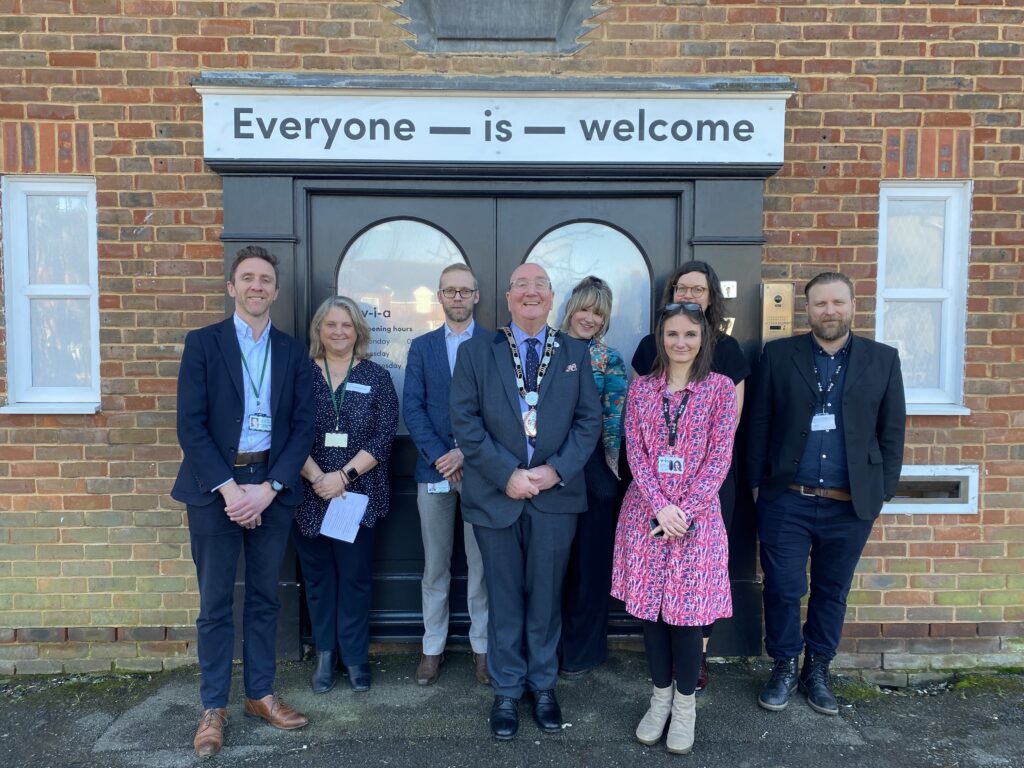
Pictured left to right: Matt Pearce, Sue Butterworth, and Steven Bow (West Berkshire Council); Cllr Billy Drummond (Chairman, West Berkshire Council); Dani Cawsey, Anna Whitton, Eleanor Lyden-Vieten, and Craig Middleton (Via).
On 30 January, drug and alcohol support charity Via welcomed local partners and community leaders to an open day at its Newbury hub. The event celebrated the service’s impact in West Berkshire and highlighted the vital drug and alcohol support available to local people.
The event was opened by Matt Pearce, Director of Public Health for West Berkshire Council, who emphasised the power of partnership in supporting local communities. Anna Whitton, CEO of Via, followed with a speech on the importance and impact of accessible, high-quality services in supporting people on their recovery journey.
Dani Cawsey, Service Manager for Via West Berkshire, provided an insightful overview of the service, explaining how it helps people through structured treatment, a wide range of support options, and dedicated programmes such as the family and friends group.
A particularly moving presentation came from Andreas Kavalierou, Via’s Reintegration Coordinator, who introduced the GLOVES programme – a unique 6-week initiative that draws parallels between the 12 rounds of boxing and the 12 steps of recovery. He spoke powerfully about how the programme gives people determination, focus, and a sense of purpose beyond their usual treatment. By enhancing responsibility, resilience, and fitness, GLOVES helps develop a winning mentality for sustained recovery. Attendees were also treated to an impressive boxing demonstration by a GLOVES graduate, showcasing the programme’s impact in action.
Jason Kew, Public Health Strategist, spoke passionately about the local Combatting Drugs Partnership, highlighting the importance of collaboration between organisations to tackle stigma, promote harm reduction, and enhance education and prevention efforts.
The day concluded with a delicious lunch and networking session, where attendees connected and explored future collaboration opportunities.
Eleanor Lyden-Vieten, Area Director at Via said: “I’m really proud of the whole Via team and the impact they have every day in the lives of the people we support. The success of this event is a testament to their hard work, enthusiasm and passion. We were happy to see so many local partners in attendance and look forward to continuing to build even stronger working relationships with them.”
Craig Middleton, Executive Director of Services at Via said: It was great to see so many partners from West Berkshire at the event. The strong interest in the service’s work was clear from all the people who attended. The team shared some wonderful examples of the support and help they offer to people who use our service and positive impact it has had.
Matt Pearce, Director of Public Health, West Berkshire Council said: “We’re proud to partner with Via. The work they do is a game changer. They become an integral part of people’s journeys with alcohol dependency and drug use and help them to take a better path.”
Category: News, UncategorizedTags: Announcement | Comments Off on West Berkshire’s drug and alcohol service packs a punch with local community event
-
Celebrating success: Peer mentor becomes BRIO Leisure ambassador
03 February 2025 by Erin Lee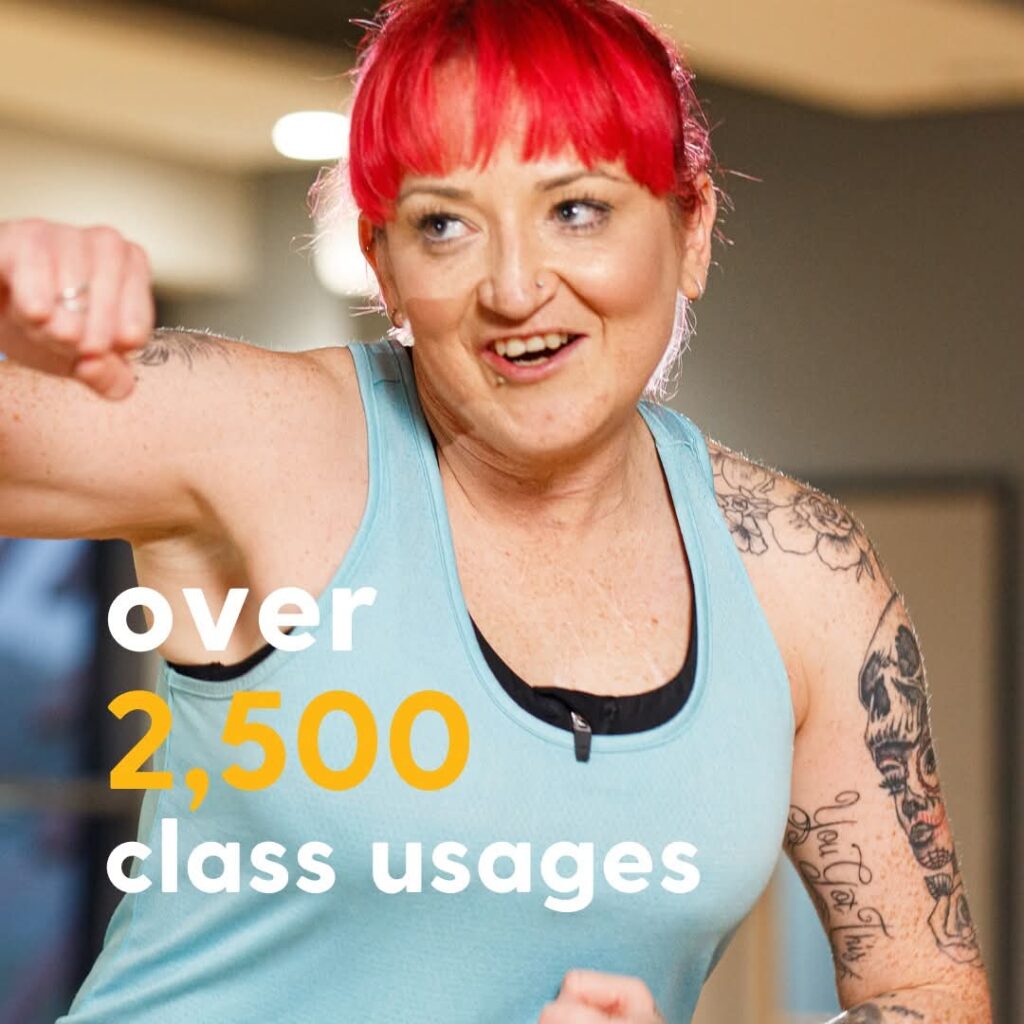 We’re incredibly proud to share the inspiring journey of Mandy Yasities, a peer mentor at our Ellesmere Port hub in Cheshire West and Chester. Mandy has recently become one of the faces of BRIO Leisure, which operates leisure centres across Cheshire and offers a wide range of health, fitness, and well-being services. Her story is a powerful example of hope, resilience, and determination.
We’re incredibly proud to share the inspiring journey of Mandy Yasities, a peer mentor at our Ellesmere Port hub in Cheshire West and Chester. Mandy has recently become one of the faces of BRIO Leisure, which operates leisure centres across Cheshire and offers a wide range of health, fitness, and well-being services. Her story is a powerful example of hope, resilience, and determination. As part of Mandy Yasities’ recovery progress, she joined Via’s gym scheme in partnership with BRIO Leisure, starting with an induction that helped her ease into the program. Over time, she embraced the physical and mental health benefits of fitness, preferring group classes over the gym itself, and made regular attendance a key part of her recovery plan.
Her consistent efforts and positive attitude have been truly transformative. Mandy is thriving in recovery and continues to encourage her peers to adopt similar routines. Her dedication caught the attention of BRIO Leisure, who invited her to participate in a photoshoot for their campaign. You may even spot her picture on bus shelter ads and billboards! Mandy’s role as one of BRIO’s ambassadors doesn’t stop there; she’s already scheduled for another photo shoot this spring.
Her story is a testament to what can be achieved with determination, community support, and access to initiatives like the gym scheme.
Here’s what Mandy Yasities had to say: “The BRIO Gym scheme has been an integral part of my recovery. It was suggested to me by my keyworker at the time – Amanda Casey at Unity House – around two years ago. I was apprehensive at first because of the stigma I thought I would face, but it was absolutely fine! It gave me a sense of purpose, something to achieve, and also something to fill my time.
I have identified over the years that routine is very important to me in everyday life. Being able to book onto classes regularly gives me a routine that I can stick to and work around other things I have going on in my life, such as volunteering at Via! I absolutely love my volunteering and am learning lots – it’s really nice to be a part of a lovely, supportive, and encouraging team.
Joining BRIO has definitely helped my recovery one hundred percent, and I am so happy to now be a part of their new campaign. It shows me how far I have come in the last two years, as there’s no way I would have done this then! I have had my struggles, as we all have, but the team at BRIO and the team at Via and Unity House have inspired me to carry on. I get loads of support and am able to use my own experiences to help others. It helps that people currently in service can see that there is hope and light at the end of the tunnel if you want it. Anything is possible!”
Amanda Casey, manager at Via, said: “Mandy Yasities has shown what hard work and determination can do, and the positive impact it can have on your life in all areas.”
Peter Davies, General Manager at BRIO Leisure said: “Unlike other clubs our centres are fully staffed with professional, qualified and passionate staff that genuinely want to help users improve their lifestyles, be it through exercise, wellbeing or socially.”
Mel Cairns, Personal Trainer and Fitness Class Instructor said: “Mandy is an amazing example of the work we can do at Brio, and her positivity and determination has been an inspiration. A little extra support is so effective when someone really wants to change their life, but I have to say the real work came from her.”
Diane Gavin, Receptionist at BRIO Leisure, said: “I first met Mandy Yasities through signing her up on the pilot scheme, and I am so proud and amazed with how dedicated she is. She is an absolute credit to the scheme due to her determination and dedication, come rain or shine. It has been an absolute pleasure to see Mandy grow and get to know her, which has become a lovely friendship.”
Category: News, UncategorizedTags: Announcement | Comments Off on Celebrating success: Peer mentor becomes BRIO Leisure ambassador
-
Via’s success and journey towards Hep C micro-elimination
16 December 2024 by Erin LeeWe’re proud to share our Hepatitis C micro-elimination impact report for 2021-2024.
At Via, working towards eliminating Hep C in our services is a key priority for us and our teams have been working tirelessly through enhanced testing, diagnosis and support, and ensuring that treatment pathways are available and accessible.
Working in partnership with Gilead Sciences, and as part of the Drug Treatment Services Providers Forum, we’ve reached many milestones over the past 3 years:
- To date, 7 of our community service sites have achieved Hep C micro-elimination.
- Our Via Harrow service was our first service to do this and the 6th London borough to reach this impressive goal.
- So far, 2 of our service sites have also maintained this status after six months and we expect more to follow.
- Between November 2021 and August 2024, our teams carried out 4,966 dry blood spot tests across our Via-led services.
- We also helped 156 people who tested positive to start treatment so they could become free of Hep C.
Carly who attends our Via Greenwich service told us: “Starting treatment was so easy. The whole process was very professional, I felt safe. So happy with the outcome, life changing, and painless compared to old treatments in the past. Thanks for all the support.”
One of our team members in Cheshire West and Chester, Alice shared: “Often our clients can struggle with engaging with medical interventions, for various reasons. Being able to support our clients at Unity House in Ellesmere Port with accessing Hep C treatment has proved valuable and successful. I believe this is in part due to the fact the service is a safe space for the client. Having seen the reactions of successful treatment, the feeling of improved general health and increased likelihood of exploring health with professionals shows Hep C treatment has a positive impact on all areas of life.”
Tom Sackville, Executive Director of Services at Via said: “It has been fantastic to see the huge progress that has been made towards the micro-elimination of Hepatitis C across Via. We know what this means for the quality of life and the wellbeing of those who use our services, so this is a really transformational achievement. I want to pay tribute to all of those within Via, as well as all the local and national partners, who have supported this work and we look forward to continuing to celebrate further progress in the near future.”
Marlon Freeman, National Hepatitis C Coordinator at Via also commented: “I am pleased to present this report, which highlights the significant collaboration and organisational advancements Via has achieved in driving sustainable progress toward Hepatitis C micro-elimination. It is an honour to join our partners at the Gilead Hepatitis C Drug Treatment Services Provider Forum in showcasing the meaningful impact our work has had on the communities we serve. We trust this will serve as evidence of how partnerships with the NHS and third-sector health organisations can effectively enhance health outcomes and reduce health inequalities among those who use substances.”
To find out more about Hep C micro-elimination, our partnership working, what we’ve learnt on our journey to micro-elimination and what’s next, check out our Via Hep C Impact Report here.

About Via
Via is a leading health and wellbeing charity that supports people to transform their lives for the better and helps them to manage their health and wellbeing independently. Providing safe and effective treatment and care around alcohol and drugs, mental health, smoking cessation, sexual health and employment support, Via supports thousands of people every year across the UK.
For more information about Via, visit: www.viaorg.uk or contact communications@viaorg.uk.
Category: News, UncategorizedTags: Announcement | Comments Off on Via’s success and journey towards Hep C micro-elimination
-
Via – New Beginnings – Brent maintains Hep C micro-elimination!
11 December 2024 by Erin Lee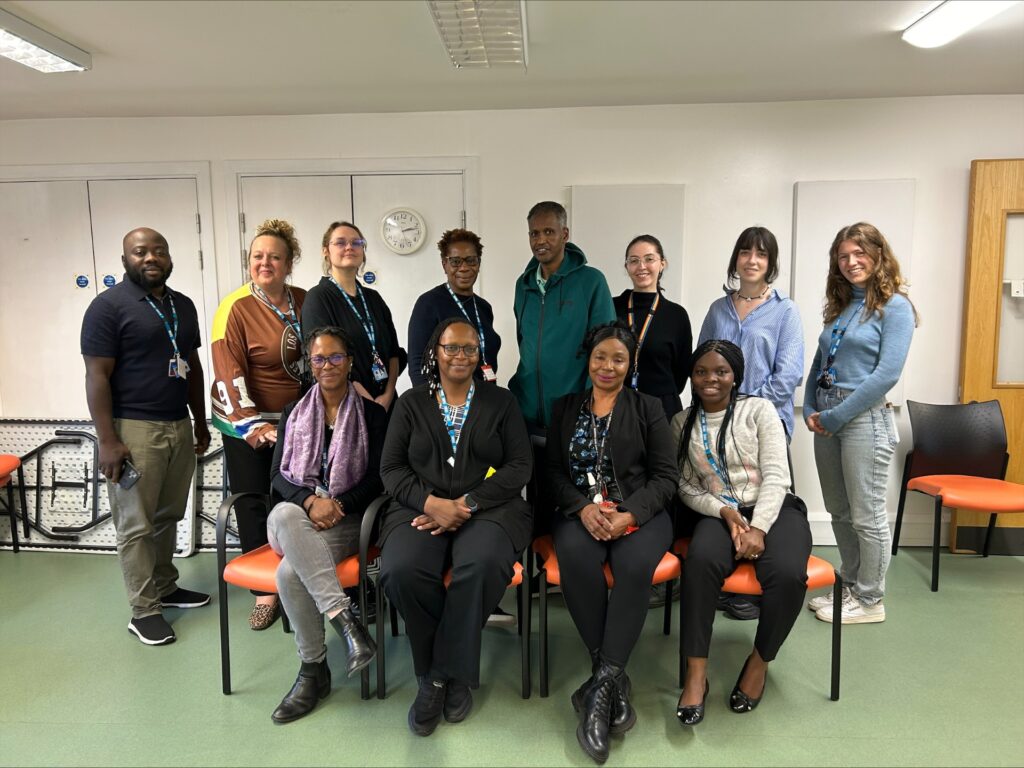
Pictured: Willesden Hub team members
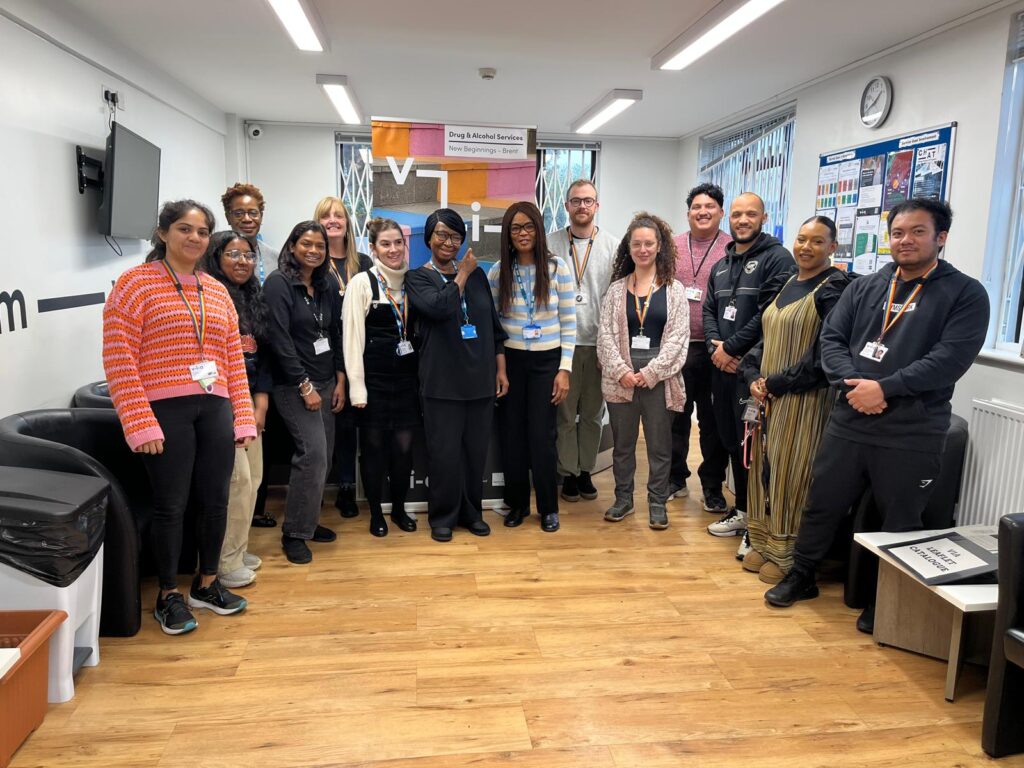
Pictured: Via – New Beginnings – Brent colleagues at Cobbold Road.
We’re delighted to announce that Via – New Beginnings – Brent has successfully maintained its Hepatitis C micro-elimination status at the 6-month mark! This is Via’s second service to re-declare this status.
A massive shoutout to everyone involved, especially to our partners Central Northwest London (CNWL) NHS Trust, and our BBV champions and nurses for their critical roles in this achievement.
We’d also like to thank our amazing recovery practitioners, who diligently conduct dry blood spot tests for those starting their treatment journey with us, making sure that we break down barriers and reduce stigma along the way.
Max Griffiths, Service Manager at Via said: “To have maintained Hep C micro-elimination 6 months after our initial announcement is amazing. It feels even more momentous than 6 months ago as it affirms that our pathways for testing and treating Hepatitis C are excelling. Well done to everyone in the New Beginnings partnership.”
Abby Campbell, Sector Manager/Non-Medical Prescriber at CNWL said: “Reaching the six-month mark in our journey toward hepatitis C micro-elimination is a testament to the strength of our partnership. Together, we have transformed our commitment into action, and with each milestone, we draw closer to a future free of hepatitis C. Well done, everyone! Here is to continued collaboration, progress, and the promise of lasting change.”
Marlon Freeman, National Hepatitis C Coordinator at Via said: “A job well done for the New Beginnings team in Brent on achieving this milestone again. It is amazing to see the perseverance in BBV testing through some challenges the past few months. A special recognition to our BBV nurse whose strong leadership has made re-declaring Hep C micro-elimination possible. Looking forward to 1 year of micro-elimination in 2025 and beyond.”
If you live in Brent and would like to talk to someone about your own or someone else’s drug or alcohol use, please contact us on 020 8459 9510 or brent@viaorg.uk.
Category: News, UncategorizedTags: Announcement | Comments Off on Via – New Beginnings – Brent maintains Hep C micro-elimination!
-
Via gets active for mental health
20 November 2024 by Erin Lee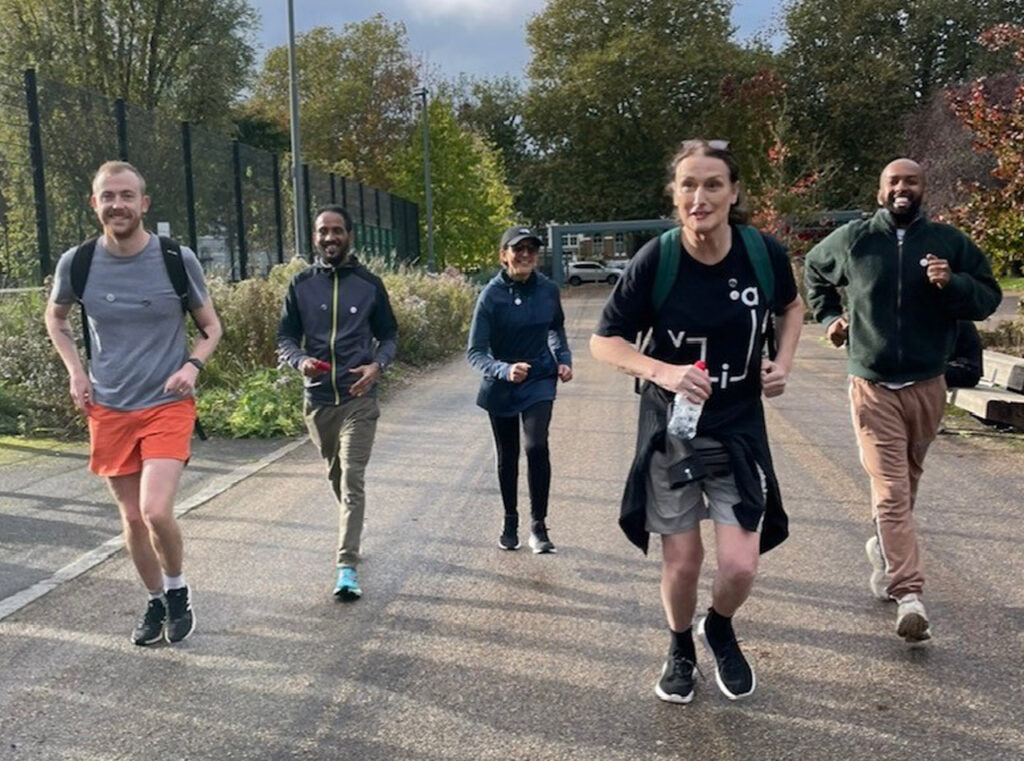
Pictured: colleagues running for mental health awareness.
Staff and volunteers from across Via gave their wellbeing a boost by taking part in our inaugural 5K Walk/Run for Mental Health last weekend.
The idea first came from our fantastic mental health first aiders but was embraced by people in different teams and services. Three separate events took place at the same time on the same day in Cheshire, Gloucestershire and London.
Everyone involved was keen to promote the importance of people focusing on their own mental health, how the benefits of physical activity can positively impact how we all feel, and also getting together and having some fun!
The event organisers, Michelle and Aman, shared their experiences of the day in London:
“We had a fantastic day in Burgess Park. All who took part seemed to enjoy the day a lot, with some running and others walking the 5K in the beautiful surroundings. After completing the 5K, we stayed behind and sat around a table outside the cafe, enjoying a cup of coffee/tea chatting away about how well everyone did and how much fun the whole day was. Plenty of smiles and a recognition how important days like this are to mental health and wellbeing.” Michelle from our Property Team
“I think everyone participated for the 5K walk/run appears to have enjoyed it. The park is very convenient and nice for a 5K walk or run; it has a beautiful lake with ducks. There were big smiles particularly when we sat by the café and chatting, which I think is so important for mental health and wellbeing.” Aman from our Finance Team
Jenni from Via Gloucestershire told us about their local event in Cheltenham: “We had a beautiful autumnal day in Pittville Park for a walk/run around the lakes. We had some people walk and talk their way round and others took to running the scenic loop. Afterwards for people able to stay we enjoyed coffee and cake in the sunshine. A thoroughly enjoyable event bringing many people together who normally wouldn’t get the chance to just chat.”
Jane from Via New Beginnings in Cheshire West and Chester said: “Our staff and volunteers took part in the mental health 5K run/walk at Delamere Forest. The day went well, the weather stayed dry and at the end we all had a coffee together. One staff member said wish they could do more of these walks.”

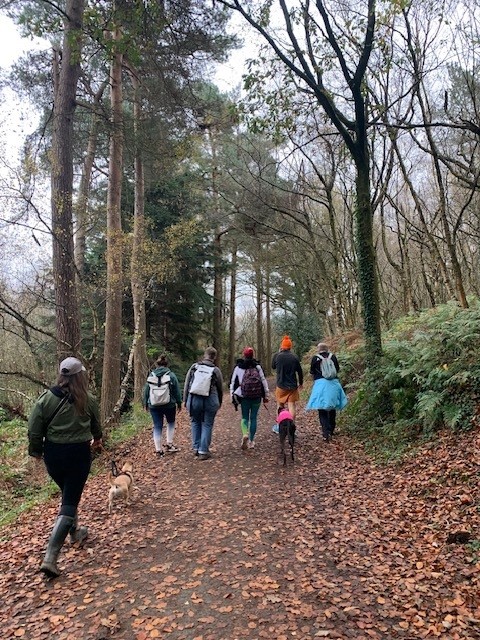
Other colleagues also shared:
“This was such a lovely and important event to be part of – our first mental health and wellbeing awareness raising cross-organisational event…getting together socially with colleagues and friends from Via, all with the same value and aim of mental wellbeing and connection. It didn’t matter if we were running or walking or just being there. It was simply wonderful and I’m looking forward to more events like these.” Stacey from the Learning and Development Team
“I loved being a part of this 5K walk, being with a wider Via work family really did put a great big smile on my face. For such a great awareness day, I felt connected with my colleagues, chatted and laughed lots while getting some exercise at the same time. This really did make me feel valued and such a friend group of amazing people. I’m looking forward to being a part of more events to come” Jean from Subwize
“It was great! Hopefully we can do another one soon!” Liz from the People Team
Congratulations to everyone who took part and a special thank you to all the local leads who help to coordinate this Via-wide event!
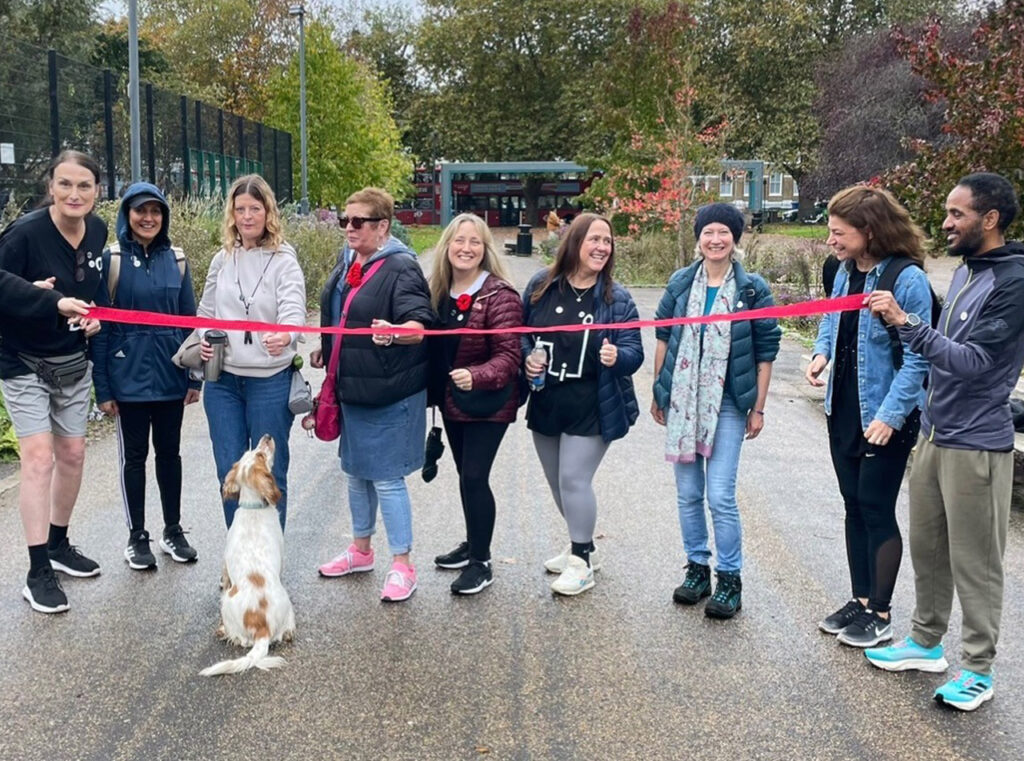
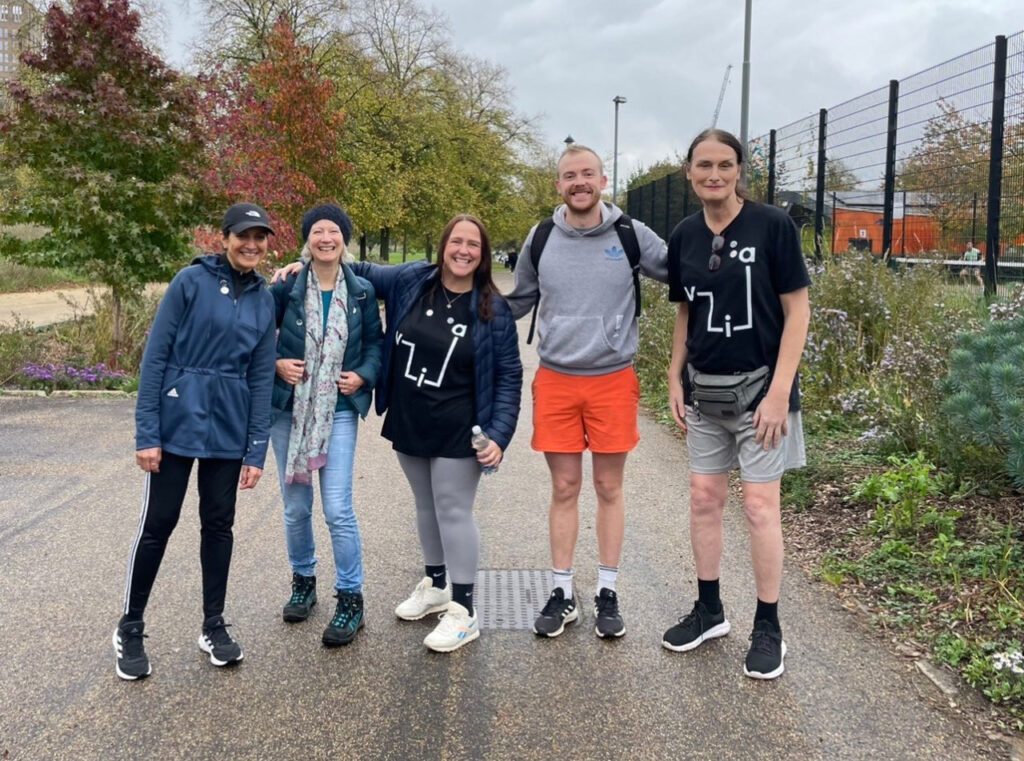
Category: News, UncategorizedTags: Announcement | Comments Off on Via gets active for mental health
-
Local chef provides work experience opportunity to aspiring cook
23 October 2024 by Erin Lee
Local drug and alcohol support service, Via Greenwich has built an exciting new partnership aimed at providing valuable skills training to people who use the service. This collaboration was sparked back in May when the service manager visited local eatery The Chef House Kitchen, for an early lunch and struck up a conversation with Lee Vitali, the chef and owner of the establishment.
During the visit, Vitali, a seasoned chef with 35 years of international experience, expressed his willingness to offer culinary training to people who get support at Via Greenwich. This conversation quickly led to developing a plan, reviewing the risks, and setting the stage for the collaboration.
The timing was perfect for Ben, who had recently completed Via’s Next Steps programme. Next Steps supports people to identify their next move as part of their recovery journey, whether into employment, volunteering, or further education. After including his goal to get back into cooking in his Next Steps portfolio, he learned of the opportunity at The Chef House Kitchen and was eager to take it up.
Ben interviewed at the restaurant and began his placement back in June. Reflecting on his experience, Ben shared, “I wanted to get out of working as a roofer. When I left school, I worked as a chef but didn’t like the hours. Recently, I thought I’d give it another go and wrote about it in my Next Steps portfolio. At the same time, this opportunity came up at The Chef House Kitchen. I felt excited and nervous about a new environment and people. I had an interview, which felt alright as Lee was very laid back and welcoming. I’ve been helping out and learning the extensive menu. I wanted the confidence to go out and work as a chef in the future. My confidence is growing all the time. It’s a safe environment – there’s no alcohol here, and Lee reassured me that if they go out after work in the future, they will not be drinking alcohol around me. I feel looked after and I’m getting fed and watered regularly!”
Lee Vitali praised Ben’s performance, stating, “Ben is very helpful. He listens well, is eager to learn, and is very proactive.”
This partnership highlights the positive impact that community collaboration can have on people seeking to improve their lives and pursue their passions. Through the support of Via Greenwich and The Chef House Kitchen, Ben and others like him are gaining the skills and confidence needed to thrive in new career paths.
Category: News, UncategorizedTags: Announcement | Comments Off on Local chef provides work experience opportunity to aspiring cook
-
Via retains young people’s service in Barking and Dagenham
09 October 2024 by Erin Lee
Subwize staff member enjoying last year’s Fun Day with children.
We’re delighted to announce that we’ve successfully retained our Subwize young people’s drug and alcohol service in the London Borough of Barking and Dagenham.
Our Subwize service will continue to go from strength to strength, offering free and confidential support to anyone aged 25 years old or under who lives, studies or works in the local area.
Also, as part of the new contract, Via will be launching refreshed and enhanced support for children and young people who are living with and impacted by parental problem alcohol and other drug use (also known as hidden harm).
The Subwize team will be working even more closely with the young people they help to ensure that they lead on all aspects of the service, they are getting what they need, and that the service is as accessible and inclusive as possible.
The new contract started on 1 September 2024 and will initially be for 4 years, with the option for two further 1-year extensions for a total of 6 years.
Anna Whitton, CEO of Via said: ‘We’re so pleased to have been successful in this contract. The team have done such a good job and we’re really proud of everything the service has achieved so far and of course we’re all excited about the future for this fantastic service.”
Gayleen Winn, Head of Young People’s Services at Via said: “The Subwize team provides an excellent service to young people and families in Barking and Dagenham and it’s so good that we can continue to do this. We’re going to build further onto the already successful work that we are doing and have some great plans for the next few years. Well done to the team for the work that went into securing the contract.”
Amolak Tatter, Commissioning Manager for London Borough of Barking and Dagenham, said: “We are pleased that Via was successful in the tender to deliver the drug and alcohol service, and we are excited to be embedding the new contract which will continue to build on previous work. The Subwize service will continue to ensure that young people across the borough are able to access the service and are supported throughout their treatment journey.”

About Via
Via is a leading health and wellbeing charity that supports people to transform their lives for the better and helps them to manage their health and wellbeing independently. Providing safe and effective treatment and care around alcohol and drugs, mental health, smoking cessation, sexual health and employment support, Via supports thousands of people every year across the UK.
For more information about Via, visit www.viaorg.uk or contact communications@viaorg.uk.
For more information about Via – Subwize, visit: www.viaorg.uk/services/barking-and-dagenham-subwize/.
Category: News, UncategorizedTags: Announcement | Comments Off on Via retains young people’s service in Barking and Dagenham
-
Via shortlisted for two Investors in People Awards
04 October 2024 by Erin Lee
We are an Investors in People finalist!
We are excited to announce that Via is a finalist for two Investors in People (IiP) Awards for 2024!
We’ve been shortlisted in the following categories:
- Third Sector Employer of the Year
- UK Employer of the Year: Gold (250+ employees)
After achieving our ‘Gold’ accreditation, we’re really proud that the important work we’ve started and continue to build on has been recognised and celebrated in this way.
Marina Deeny, Director of People said: “We’re delighted to be an Investors in People Award Finalist. It reflects our ongoing efforts to foster a culture of excellence, innovation, and inclusivity where we live and breathe our values of care, be human, and do the right thing. We are proud of the progress we have made and are excited about the future as we continue to invest in our people and their development. Thank you to Investors in People for this incredible honour, and congratulations to all the other finalists.”

About Via
Via is a leading health and wellbeing charity that supports people to transform their lives for the better and helps them to manage their health and wellbeing independently. Providing safe and effective treatment and care around alcohol and drugs, mental health, smoking cessation, sexual health and employment support, Via supports thousands of people every year across the UK.
For more information about Via, visit: www.viaorg.uk or contact communications@viaorg.uk.
Category: News, UncategorizedTags: Announcement | Comments Off on Via shortlisted for two Investors in People Awards